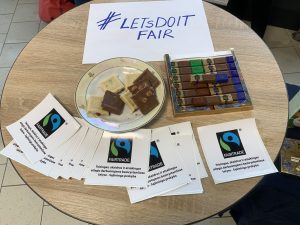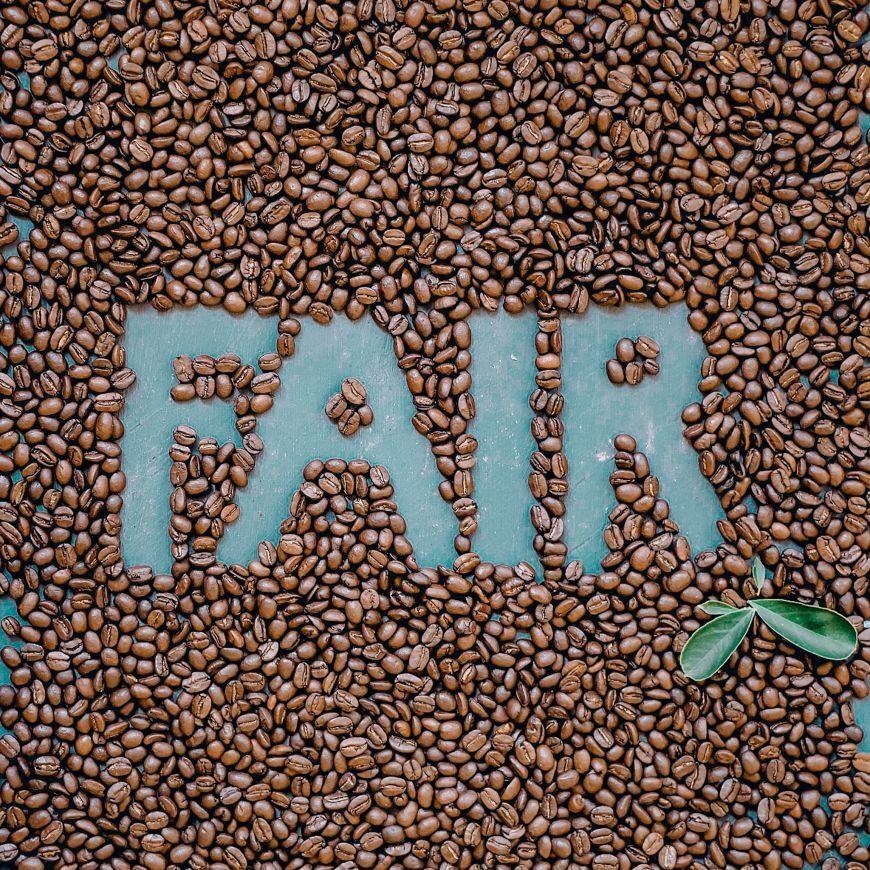
Spalio 1 d. švenčiama kavos diena (ypač Fairtrade kavos:)), o spalis ,- Fairtrade mėnuo. Ta proga pristatome Fairtrade kavos entuziastų balsą:
Listen up Fairtrade coffee enthusiasts
Happy International Coffee Day 2024!

This year Fairtrade is celebrating the diversity, quality, and passion for coffee, but we are also raising awareness of the challenges coffee farmers are facing in today’s environment.
Fairtrade’s Monika Firl, Senior Advisor, Coffee, was a guest on the Daily Coffee Pro Podcast by Map It Forward hosted by Lee Safar. The two talked openly the difficulties coffee farmers are dealing with when it comes to climate change and the new regulatory landscape, as well as Fairtrade and its mission and the challenges it faces as an organisation.
Here is a recap of the five episodes:
Episode 1: What is Fairtrade International in 2024
In this episode, Monika talked about Fairtrade’s early beginnings and how the organisation has grown into what it is today – a global organisation representing two million farmers, yes two million, with three producer networks and 19 national Fairtrade offices around the world.
Monika discussed Fairtrade’s decision-making process and contrary to what people unfamiliar with Fairtrade may know, it’s not one person but a “complex web of people and voices” who interact, discuss, and make decisions together democratically.
Did you know? Fairtrade producers have 50 percent of the vote during our annual General Assembly, and farmers and workers are also consulted with and are co-creators when it comes to updates to Standards and policies.
Episode 2: The distance between language and action for Fairtrade.
The misconceptions about Fairtrade were explored in this episode. Asked directly if Fairtrade farmers were truly getting a good deal, Monika explained that producer organisations understand the difference between profit and loss, and they believe in the Fairtrade certification because they see the benefits.
This includes the Fairtrade Minimum Price (FMP), Living Income Reference Prices, and the Fairtrade Premium. Plus, Fairtrade standards that require decent working conditions and prohibit discrimination, forced labour, and child labour.
Did you know? Fairtrade is working on a coffee dashboard, one of its latest digital tools to provide information about producers and origins, services and programmes, as well as living wages and climate adaptation.
Episode 3: Is Fairtrade here to save anyone?
Fairtrade is not a saviour is what Monika made clear during this episode. She explained that there is sentiment in the coffee industry that if something is wrong Fairtrade should fix it. She said Fairtrade works tirelessly to be “champion for farmers rights, but we don’t have a magic wand.”
Moreover, she added that stakeholders in the coffee industry must work together and get back to basics to ensure that coffee farmers are given a fair deal to support themselves and keep the industry afloat.
Did you know? The Fairtrade structure facilitates collaboration thanks to the national Fairtrade offices, producer countries organised under the producer networks, and topical working groups who all come together to navigate the many challenges that farmers face.
Monika went deep into combo contracts during this episode. She explained that combo contracts are not new, and, in fact, are indicative of the imbalance of power between traders and producers. “This is not a blind spot for Fairtrade, it is something we grapple with and are working to come up with solutions that do no harm as well,” she said.
Furthermore, it’s about shifting the mindset from extractive to collaborative contracting, she said. Adding: “We don’t want to be pushing clients away from producer organisations who still see a benefit of developing a relationship with a certain company.”
Did you know? Transparency and traceability are a core process of the Fairtrade, and that while it takes time and more effort to operate in ways that benefit people and planet, it’s worth it.
Episode 5: What role does Fairtrade play in the coffee crisis
This episode focused on Fairtrade’s role in the current coffee crisis. “The solution is simple…we need to bring producer voices into the conversation, in the decision-making processes, and at the earliest opportunity,” Monika said. She explained that Fairtrade’s strength is having “ears and eyes on the ground” who are living the situation and providing us with up-to-date information.
The episode also include a discussion about new regulations, such as EU Deforestation Regulation (EUDR), and the difficulties that Fairtrade’s small-scale coffee farmers are facing.
Did you know? According to a new study, Fairtrade coffee farmers are better positioned to protect forests and meet the EUDR requirements thanks to their compliance with the Fairtrade Standards that guide them to implement key forest protection measures and align with the requirements of the EUDR.
Learn more by listening to the entire episodes of the DailyCoffee Pro Podcast on the links above wherever you get your podcasts.
P.S. Parengta pagal Fairtrade.net
